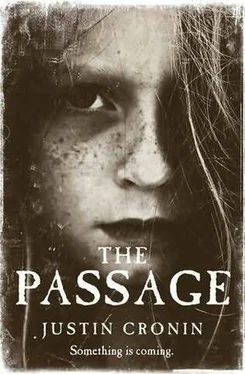“I thought I was.”
“That’s what you thought . We’re just people. I don’t know what’s up that mountain, but I do know that much. We live, we die. Somewhere along the way, if we’re lucky, we may find someone to help lighten the load. You should tell them it’s okay. They’re waiting to hear from you.”
It still confounded him, how slow he’d been to detect what was happening with Sara and Hollis. Perhaps, he thought, it was something he hadn’t wanted to see. Looking at Alicia now, her hair shining in the morning light, he found himself recalling their night together on the roof of the power station, the two of them talking about pairing, having Littles; that strange and amazing night, when Alicia had given him the gift of stars. At the time, just the idea of it, of living a normal life, or what passed for one, had seemed as distant and impossible as the stars themselves. Now here they were, more than a thousand kilometers from home-a home they would probably never see again-the same people they had always been, but also not the same, because something had happened; love was among them.
That’s what Alicia was telling him now; that’s what she had been trying to tell him that night on the roof of the power station, in that last easy hour before everything had happened. That what they did, they did for love. Not just Sara and Hollis; all of them.
“Lish-” he began.
But she shook her head, cutting him off. Her face was suddenly flustered. Behind her, Sara and Hollis were emerging from the shelter, into the morning.
“Like I said, we’re all here because of you,” Alicia said. “Me more than anyone. Now, are you going to wake up the Circuit or am I?”
They broke camp; by the time they were moving downriver, the sun had lifted over the crest of the valley, filling the branches of the trees with a vaporous light.
It was almost half-day when Alicia, at the head of the line, abruptly halted. She raised a hand to silence everyone.
“Lish,” Michael called from the rear, “why are we stopping?”
“Quiet.”
She was sniffing the air. Peter smelled it too: a strange and powerful odor, stinging his nostrils.
Behind him, Sara whispered, “What is that?”
Hollis pointed with his rifle over their heads. “Look-”
Suspended from the limbs above their heads were dozens of long strands of small, white objects, bunched like fruit.
“What the hell is that?”
But Alicia was looking at the ground now, anxiously scanning the carpeted earth beneath their feet. She dropped to a knee and brushed the heavy covering of dead leaves aside.
“Oh, shit.”
Peter heard the groan of the dropping weight. Before he could speak the net had swallowed them; they were rising, lifting through the air, all of them yelling and tumbling, their bodies caught in its weave. It reached the apex of its ascent, everything cradled in suspension for one weightless instant, and then they descended, a hard drop, their bodies jamming together as the ropes compressed them into a single, twisting, captive mass.
Peter was upside down. Somebody, Hollis, was on top of him. Hollis and also Sara and a sneaker, close to his face, which he recognized as Amy’s. It was impossible to tell where one body ended and the next began. They were spinning like a top. His chest was compressed so tightly he could barely breathe. The skin of his cheek was pressed against the ropes, which were made of some heavy, fibrous twine. The ground was twirling under him, a rush of undifferentiated color.
“Lish!”
“I can’t move!”
“Can anyone?”
Michael: “I think I’m going to be sick!”
Sara, her voice shrill with panic: “Michael, don’t you dare!”
There was no way Peter could reach his blade; even if he could have, severing the ropes would have sent them all plunging headlong to the ground. The spinning motion slowed, then stopped, then started again, its velocity increasing as they were flung in the opposite direction. Somewhere above him in the jumble of bodies he heard Michael wretch.
They spun and spun and spun some more. It was on the sixth rotation that Peter detected, from the corner of his rolling eye, a tremulous motion in the brush. Like the woods were moving, coming to life. But by then he was too disoriented to speak. Part of him felt fear, but the rest of him could not seem to find this part.
“Holy goddamn,” a voice below them said, “they’re strags.”
And then Peter saw: they were soldiers.
In the first days, Mausami slept-sixteen, eighteen, twenty hours at a stretch. Theo had chased the mice away from the upstairs bedroom, whisking them down the stairs and out the door with a broom and a great deal of yelling. In a closet they had found, folded with an eerie care, smelling of time and dust, a pile of sheets and blankets, even a couple of pillows, one for her head and a second to fold between her knees to straighten her back. Random electric currents, exquisitely painful, had begun to shoot down one of her legs-the baby, compressing her spine. She took it as a sign that the baby was doing what it was supposed to do, making space for himself in the densely packed room of her body. Theo came and went, fussing over her like a nurse, bringing her meals and water. He slept during the afternoons on the old saggy sofa downstairs, and when evening fell he dragged a chair out to the porch, where he sat through the night, a shotgun on his lap, staring into the dark.
Then one morning she awoke to a fresh, new vigor coursing through her. The drought of energy was over; the days of rest had done their work. She drew up to a sitting position and saw that the sun was shining in the window. The air was cool and dry, pushing a gentle breeze that shifted in the curtains. She did not remember opening the window but perhaps Theo had done this, sometime in the night.
The baby was sitting on her bladder. Theo had left a pail for her, but she didn’t want to use this, now that she no longer needed to. She would make the long march to the privy, to show Theo that she was finally awake.
Even now, she could detect his movements somewhere in the house below. She rose, pulled a sweater over her long-tailed shirt-she was suddenly much too big for the only pair of gaps she had-and descended the stairs. Her center of gravity seemed to have shifted overnight; the frank bulge of her stomach made her feel top-heavy and clumsy. She supposed this was just something to get used to. Not even six months, and here she was, huge already.
She stepped into a room she barely remembered; it took her a moment to absorb the fact that a great deal had changed. The sofa and chairs, which before had been pushed against the walls, now stood in the middle of the room at right angles to the fireplace, facing one another. Between them rested a small wooden table atop a threadbare woolen rug. The floor under her bare feet was free of dirt, swept clean. Theo had laid more blankets over the sofa, tucking the edges in, to cover the places where it was worn through and stained.
But what drew her attention were the pictures propped on the mantel. A series of yellowed photographs-the same people, at different ages and in different configurations, all posed before the very house in which she now stood. A man and his wife and three children, a boy and two girls. The photos seemed to have been taken at intervals of a year; in each, the children had grown. The youngest, a baby in the first photograph, held in his mother’s arms-a tired-looking woman wearing a pair of dark glasses perched above her forehead-was, by the final image, a boy of five or six. He was standing in front of his older sisters, grinning greedily for the camera, showing the gap in his smile where he had lost a tooth. His T-shirt read, incomprehensibly, UTAH JAZZ.
Читать дальше












